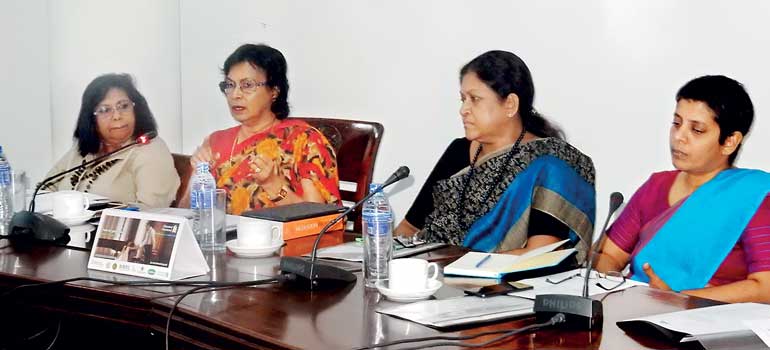Sunday Feb 22, 2026
Sunday Feb 22, 2026
Tuesday, 10 January 2017 00:00 - - {{hitsCtrl.values.hits}}
 Ceylon Chamber of Commerce CEO Dhara Wijayatilake stressing a point during the meeting (second from left). On her right are representatives of the Asia Foundation
Ceylon Chamber of Commerce CEO Dhara Wijayatilake stressing a point during the meeting (second from left). On her right are representatives of the Asia Foundation
Introduction of ‘Commercial Mediation’ will offer Sri Lanka’s business community an optional dispute resolution mechanism in addition to litigation and arbitration, both of which are riddled with delay and expense.
Mediation, if practiced in strict compliance with its intrinsic principles offers a process that will hopefully be devoid of those evils, said Dhara Wijayatilake, CEO of the Ceylon Chamber of Commerce.
She made this observation at a preliminary briefing convened by the CCC during last week to discuss the steps that are required to be taken to provide mediation services for commercial dispute resolution in terms of the Commercial Mediation Centre of Sri Lanka Act No. 44 of 2000 as amended by Act No. 37 of 2005.
The briefing was attended by Members appointed to the Board of Management of the Centre by the Minister of Justice on the nomination of the Ceylon Chamber of Commerce (CCC), the National Chamber of Commerce (NCC), the Federation of Chambers of Commerce and Industry (FCCISL) and the Ceylon National Chamber of Industries (CNCI) and other representatives from private sector Companies. Representatives of The Asia Foundation (TAF) which has provided assistance for the Community Mediation programme of the Ministry of Justice from its inception in 1990, was also present at the briefing and provided technical support.
Wijayatilake observed that if Sri Lanka is serious about inspiring investor confidence, there was a need to look at alternative dispute resolution methods that are more efficient and effective than the adversarial process available through litigation.
The business community looks for processes that have the potential to deliver on both of those features, i.e. effectiveness and efficiency.
Dinesha Wickremanayke, resident representative, TAF spoke of the importance of training for mediators and highlighted the assistance given to the Ministry of Justice to train mediators for community mediation as well as for the special land mediations conducted in the north.
Speaking on the current status of community mediation in Sri Lanka, Ramani Jayasundere, Senior Technical Advisor of TAF explained that the Mediation Boards function in every divisional secretary’s division in the island to resolve community disputes. She presented statistics that pointed to a greater use of the community Mediation Boards for the resolution of “money matters” after the increase of the monetary threshold which required that disputes up to Rs. 500,000 in value, must mandatorily be referred to these boards before action could be filed in a court of law.
The Board of Management of the Centre also includes a nominee of the Minister of Justice and a nominee of the Minister of Industry and Commerce.
The members also discussed the several steps that the Board would need to pursue to offer mediation services to the private sector and noted that training of mediators would be an essential step and that the four chambers would have to ensure collectively that mediation services are sustained, if successful.